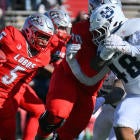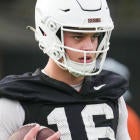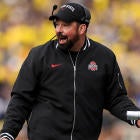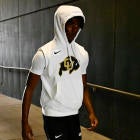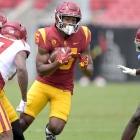College football's latest tenuous steps toward an on-time return are being taken. The NCAA College Football Oversight Committee will submit a detailed four-phase plan next week for football activities to begin in mid-July.
The committee will recommend that coaches begin interacting with players on July 13 with training camp starting on Aug. 7. Those dates would each be pushed up a week for the handful of teams competing in Week 0.
Testing for the coronavirus is still largely a conference-by-conference enterprise as is the possibility of coaches possibly having to wear facemasks on the sideline during games.
The oversight committee's recommendations were shared with the conferences for input before the vote Thursday. The NCAA Council will be tasked with giving the preseason calendar final approval when it meets on June 17.
"I think we have vetted it up enough, buttoned up next week so we can move forward," oversight committee chair Shane Lyons told CBS Sports.
2020 preseason college football calendar
| Dates | Period | Details |
|---|---|---|
June 1-25 | Voluntary workouts | Voluntary and virtual non-physical activities |
July 13 onward | Team workouts | Weight training, conditioning, film review |
July 24 onward | Walkthroughs, team meetings | 20 hours per week up from 8 hours |
Aug. 7 onward | Practice | Preseason practice period |
Programs kicking off Labor Day weekend, the traditional Week 1, will be allowed 20 hours with players per week from July 24-August 6. Those are divided up between six hours of walk throughs, six hours of meetings and eight hours of strength and conditioning work. The period beginning July 13 is referred to as "summer access," which gives players the ability to work without coaches.
Traditional two-a-days were not considered. Though the NCAA banned them in 2017, NCAA chief medical officer Brian Hainline recently said data did not conclude there was a negative impact on head trauma during two-a-days.
Lyons, who is also West Virginia's athletic director, said any extension of the regular season would have required a change in NCAA legislation. The 2020 season is scheduled to end Dec. 5 with the Army-Navy Game taking place the following week.
Extending the four-game redshirt rule is a consideration that may come at a later date. There was some thought that, in order to address possible depth issues, players could potentially play more than four games and still retain that year of eligibility.
The committee has not yet addressed the issue of fans in the stands. Lyons said the future is so uncertain that he is not sure he could fill West Virginia's 60,000-seat Milan Puskar Stadium. Attendance restrictions could be determined by the conferences.
"Even if they did say [we could fill the stadium], what percentage of people are interested in coming?" he asked. "… I don't believe we're going to have 60,000 even if they did allow us to. I don't think I could sell it out. We're all focusing on the start of the season."
The guidelines include a requirement for teams to practice for four weeks before playing their first game. If teams aren't able to get that much practice, the FBS commissioners have basically already spoken: The 10 conferences may not be in sync in terms of starting on time. Within those conferences, not all the teams may be on the same page, either.
Furthermore, do not expect any replacements for the canceled spring games.
Schools were allowed to have athletes back on campus June 1. Several schools began voluntary workouts on Monday. Most programs will begin voluntary workouts by June 15.














